Colleen Kitts-Goguen, 53, married with kids, started university again last year. She worried she wasn’t smart enough and that St. Thomas University students wouldn’t accept her.

“I felt tremendous support from the professors, and really embraced by the students,” said the communications major.
The fill-in host for CBC’s Shift wasn’t always confident in her abilities. Her insecurities derailed her first attempt at a university degree, an English degree at Mount Allison.
“I just didn’t feel like I belonged there. I didn’t feel like I was smart enough.”
Kitts-Goguen was overwhelmed early on. She did well in high school receiving academic scholarships, and was allowed to skip her first year. But she didn’t quite fit in. No one in her family had received a university degree.
“The kids would talk about things I had no frame of reference. My family didn’t have a new car and we didn’t go on skiing trips,” she said. “There are all those things you don’t grow up with. When you go to university and you’re surrounded by people who all have that background, I found it daunting.”
Her father struggled with alcoholism, leaving her mother to take care of five children in the 1960s – a time, Kitts-Goguen explains, that wasn’t too kind to people in need. Her mother was recovering from tuberculosis and needed help, but because she was married it was hard to get help. There was a stigma about people on welfare, she said.
“It makes you feel less than others even though there’s no evidence. There’s no reason to feel that way.”
Goguen didn’t quite fit in with her middle-class classmates, so she left for broadcast school, attending Fanshawe College in London, Ont. and receiving a diploma in broadcast journalism. In the early 1980s she was hired by CBC-Radio’s Information Morning Moncton and her insecurities crept back.
“I never thought I was very good at what I did. Even though I did it for four or five years,” said Goguen. “I felt inadequate at the job.”
She said many journalists struggle with insecurity. Sometimes it comes off as over-confidence, but the competitive nature of most newsrooms leads many to struggle.
“I never felt like I earned it. I never felt like I deserved it.”
Kitts-Goguen got the hosting job in her early 20s, a job most don’t achieve until their 40s. She was happy to have the job, but then became pregnant with her first son.
“I felt a bit of relief. I thought, ‘OK I’m not gonna go back to work,’” she said. “I didn’t think I was good enough for the job to begin with, so it was a bit of relief.”
Kitts-Goguen would later have two more sons, university aged now, who have struggled with bouts of clinical depression and anxiety. Goguen made the decision to try to overcome her own battles.
“Part of me was setting an example for them (her sons), but really it was about proving to myself that I could do it.”
She contacted Phillip Lee, a journalism professor at St. Thomas University, who told her they would do all they could to help her succeed.
“I have felt tremendous support from the professors, and really embraced by the students.”
She couldn’t hold back tears when she remembered the students in Lee’s print class last year. They valued her opinion and input. She said a few of them told her she was their Fredericton mom. They grasp things quickly and, in a way, helped her validate herself.
“I always needed, and probably still do to a certain extent, the validation of others to tell me I’m doing OK. That’s tricky. You should be able to know within yourself what your worth is,” she said. “Knowing your own worth is important.”
While Goguen still struggles with self-validation from time to time, she’s dreaming about graduation next year.
“I want to go to graduation. I want to wear the gown. I want that whole experience because I never had it,” she said. “I want to be able to put my degree on the wall.”
